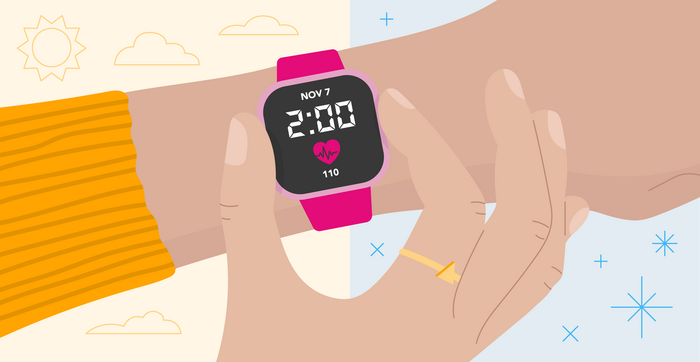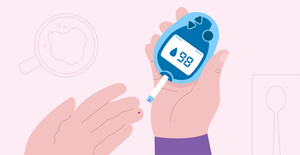Key points
- Daylight savings can disrupt our circadian rhythm, leading to potential health issues.
- "Falling back" can lead to changes in appetite and mood due to altered sunlight exposure and meal times.
- "Springing forward" is associated with increased risk of car accidents, heart attacks, and strokes due to sleep deprivation.
- To manage daylight savings, maintain a consistent sleep schedule, exercise regularly, and expose yourself to natural sunlight.

Daylight savings requires us to “spring forward” in the spring and lose an hour of sleep, and “fall back” in the fall to gain an hour of sleep. Though these time changes may occur only twice a year, they can cause disruptions to our body clocks and have negative long-term effects on our health.
Fortunately, you can prepare your body for these time adjustments and lessen the adverse impact they may have on your health so that you don’t experience any health effects of daylight savings.
How Does Daylight Saving Time Affect Sleep?
Daylight saving time causes us to lose an hour of sleep when we set our clocks an hour ahead in the spring. One hour of sleep loss may not seem significant. However, it can disrupt our internal body clocks, also known as circadian rhythm.
According to the NIH, our circadian rhythm is mainly influenced by sunlight. Exposure to sunlight causes the brain to help us stay alert, active, and awake as long as the sun is up. When the sun goes down, our brains start producing a hormone called melatonin that promotes sleepiness, and it helps us stay asleep until the sun rises again the next morning.
Circadian rhythm affects a wide range of bodily systems in ways that allow us to maintain good overall health. Any changes made to our circadian rhythm, no matter how small, can affect our hormonal balance and increase the risk for a variety of serious health problems, including insomnia, depression, and poor immunity.
Health Effects of ‘Falling Back’
Falling back can lead to changes in appetite. Studies published by the NIH indicate that you may feel hungry an hour earlier than you usually do, which can lead to irritability and hunger pangs if you need to hold off on eating due to a later work lunch break. Eating late can often result in overeating, especially since hunger is driven by hormones.
Depression and mood changes are some other significant health effects of falling back. According to research published by Wolters Kluwer Health, people tend to spend more time indoors during the fall and winter seasons and leave work or school after it has already started to get dark. This leads to less sunlight exposure and lower levels of vitamin D.
According to findings published in Issues in Mental Health Nursing, vitamin D deficiency is linked to depression and other mental health disorders. Lack of sunlight and reduced vitamin D levels can lead to bouts of depression after turning back the clock.
Health Effects of ‘Springing Forward’
Springing forward is associated with far more health effects than falling back because we lose an hour. According to a study by the University of Colorado at Boulder, the extra hour of sleep deprivation we experience during daylight savings has been linked to a higher number of car accidents, noting that, “the annual switch to daylight saving time is associated with a 6% increase in fatal car crashes that week.” Other studies have shown increases in heart attacks and strokes during the same period.
In a 2009 study published in the Journal of Applied Psychology, researchers found that the number of workplace injuries that occur on the Monday following daylight savings time increases by 5.7%. Results from a 2001 study published in Sleep Medicine that examined several years’ worth of auto accidents found that the number of car accident deaths jumped from an average of 78.2% to 83.5% on the Monday following daylight savings time.
Applying these effects to healthcare professionals is equally concerning. Bhanu Kolla, M.D., a psychiatrist at the Mayo Clinic specializing in addiction and sleep, has studied these effects, particularly focused on preventable human errors during the week following the spring time change. "And in that timeframe, the number of human errors went up by about 18.5 percent as compared to the previous week," Kolla indicates. However, he also says, "There is this increased risk, but this doesn’t necessarily translate to adverse outcomes." Meaning the impact on patients is relatively minor.
Similar types of studies show an increase in the rate of heart attacks and strokes on the Monday following “springing forward” due to the extra hour of sleep loss. In an April 2016 meeting, the American Academy of Neurology announced that the rate of ischemic stroke is 8% higher during the first two days after a daylight savings time transition.
Trang VoPham, M.D., an epidemiologist at Fred Hutchinson Cancer Research Center who has studied the health impacts of daylight saving time, sees light at the heart of the health impact of the clock change. Trang discussed his research on the Freakonomics, M.D. podcast highlighting, "We found that the spring Daylight Saving Time transition was associated with an increased risk for fatal traffic accidents in the U.S. And the association between the spring Daylight Saving Time transition and fatal traffic accident risk was more pronounced farther west in a time zone."
Why don't we just eliminate Daylight Saving Time?
The majority of states in the United States are considering making one of the time adjustments permanent. However, states that are leaning toward permanent Daylight Saving Time — what we have in the spring and summer — and permanent Standard Time — what we have in the fall and winter — are about evenly split.
Of course, it isn't that easy. Despite the fact that federal law enables states to opt out of Daylight Saving Time, they cannot opt back in permanently. The Sunshine Protection Act, a bipartisan bill in the United States Congress, would make Daylight Saving Time permanent, with limited exceptions. We'll simply have to wait and see if lawmakers decide to move forward with a vote on the bill, which has been under consideration since February 2021. In the meantime, we just have to manage it — and our health — the best way we can.
How to Manage Daylight Saving Time
After turning the clock forward or backward, it’s important to take extra good care of yourself until your body has fully adjusted to the time change.
Dr. Anthony L. Komaroff, MD from Harvard University recommends exercising at the same time every day to get your circadian rhythm back on track. He also recommends maintaining a consistent sleep schedule and taking one to two afternoon naps during the first week to catch up on lost sleep. Other sleep experts recommend getting up earlier before the time change in the spring to help the body gradually adjust and to try spending as much time in sunlight as possible to beat daylight savings health effects.
Tips for Improving Sleep During Daylight Savings
Certain behaviors can improve your sleep quality during the daylight savings time transition. Try these tips from the [source] to avoid sleep loss during the days following a time change:
- Open your blinds and curtains immediately upon waking to expose your body to natural sunlight.
- Eat a healthy breakfast first thing in the morning to help your body adjust to the time change.
- Exercise at the same time every day during sunlight hours to fall asleep more quickly at night.
- Establish and follow a consistent sleep schedule so you can wake and fall asleep at the same time every day.
- Limit your naps to no more than 15 or 20 minutes only in the afternoons to help your body adjust to the time change.
Do’s and Don’ts of Daylight Savings Time
Follow this list of do’s and don’ts from the [source] to avoid the negative health effects of daylight savings:
- Do go to bed and wake up 15 minutes earlier every day for several days leading up to the springtime change to help your body gradually adjust.
- Do expose yourself to natural sunlight early on in the day to help regulate your body’s circadian rhythm.
- Don’t drink high amounts of caffeine in an effort to combat the time change, as this may throw off your sleep cycle even more.
- Don’t expose yourself to artificial light sources, including televisions and smartphones before bedtime, as this can make it more difficult for you to fall and stay asleep.
- Do eat healthy snacks between meals when you’re hungry, and avoid overeating in one sitting when meals are delayed due to time changes.
Solv strives to empower healthcare consumers like you to make the best decisions for yourself and your family. Visit our website today to find the nearest urgent care and walk-in clinics that can provide the high-quality health care you and your family deserve.
FAQs
How does daylight saving time affect our health?
Daylight saving time can disrupt our circadian rhythm which can lead to health problems such as insomnia, depression, and poor immunity.
What are the health effects of "falling back"?
"Falling back" can lead to changes in appetite, irritability, overeating, and mood changes due to less sunlight exposure and lower levels of vitamin D.
What are the health effects of "springing forward"?
"Springing forward" can lead to increased risk of car accidents, heart attacks, and strokes due to the extra hour of sleep deprivation.
How can we manage the effects of daylight saving time?
To manage daylight saving time, maintain a consistent sleep schedule, exercise regularly, expose yourself to natural sunlight, and avoid high amounts of caffeine and artificial light sources before bedtime.
Why don't we just eliminate daylight saving time?
Eliminating daylight saving time is under consideration in many states, but federal law currently does not allow states to opt back into daylight saving time permanently.
What are some tips for improving sleep during daylight savings?
To improve sleep quality during daylight savings, you can expose your body to natural sunlight upon waking, eat a healthy breakfast first thing in the morning, exercise during sunlight hours, follow a consistent sleep schedule, and limit your naps to no more than 15 or 20 minutes only in the afternoons.
What are some do's and don'ts of daylight savings time?
Some do's include going to bed and waking up 15 minutes earlier every day for several days leading up to the springtime change and exposing yourself to natural sunlight early on in the day. Some don'ts include drinking high amounts of caffeine to combat the time change and exposing yourself to artificial light sources before bedtime.
Where can I find more information about managing the effects of daylight saving time on my health?
Solv strives to empower healthcare consumers to make the best decisions for their health. You can visit their website to find the nearest urgent care and walk-in clinics that can provide high-quality health care.









